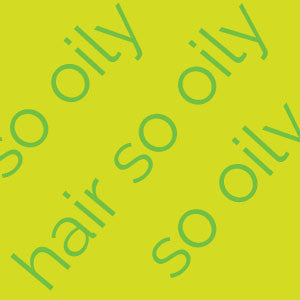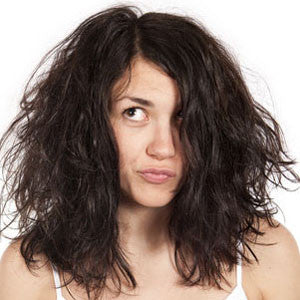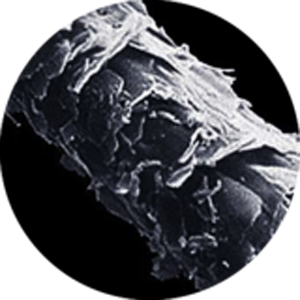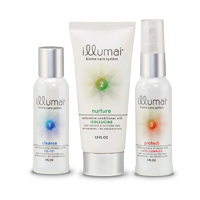Why is My Hair So Oily?

Why is my hair so oily?
Everyone’s scalp produces oil, but for some, oil production seems to hit overdrive. Why? At the base of every hair is the follicle – it lies just under the surface of the skin in the dermis. Each follicle is paired with a sebaceous gland, which produces a natural lubricant called sebum. Sebum is part of our dermal biome - it waterproofs the skin and hair and protects it from moisture loss. It’s also what’s responsible for keeping our skin and hair soft and supple. But when sebum is over-produced, the result is oily, greasy-looking skin and hair.
If you’re trying to pinpoint why your rate of sebum production is high, there’s more than one factor that can contribute to an oily hair situation:
Your Hair Type:
- Got fine hair?There’s less surface area on fine hair, so there’s more oil than there is hair to cover - fine hair looks greasier than coarse hair with the same rate of sebum production.
- Super straight? Sebum has no waves or curls to keep it near the roots only – it’s distributed more easily down the lengths of the hair.
- Is your hair curly or coily? Chances are your hair is greasier at the roots. Curls slow the sebum from moving down the hair shaft, resulting in oily scalp and roots, but dry, easily-damaged ends.
- Thick hair? If you’ve got lots of hair, you’ve got lots of follicles…. And the more follicles you have, the more sebaceous glands you have. More glands = more oil.
Hormones: Hormone fluctuations in both men and women can be triggered by stress, puberty, pregnancy, menopause or medications (including birth control pills) and can result in excessive sebum production. If you notice a sudden onset of greasy hair, your hormone levels might be the culprit.
Skin conditions: Seborrheic dermatitis and psoriasis both can both be associated with excessive sebum production. In these cases, greasy hair is accompanied by dandruff or scaly dry skin.
Genetics: Did your mom or dad have greasy hair? There’s a good chance their high rate of sebum production has been passed on to you.
What can I do for my oily hair?
The best way to care for an oily scalp is to begin caring for your biome. When your biome is in balance, oily hair symptoms don’t occur as frequently. Here’s how:
- Wash it! Although those with an oily scalp need to wash more frequently, it doesn’t necessarily need to be every day. In fact, over-stripped hair stimulates the sebaceous glands to produce more oil and the vicious cycle continues. Try choosing clear, lathering shampoos without harsh sulfates and focus on cleansing the scalp, rather than the hair. Follow with either a lightweight conditioner through your lengths, or a heavier conditioner only from the mid-length to the ends.
- Get the Right Stuff. The right products are key for dealing with oily hair or scalp. Stay away from silicones – they are not friendly to an oily scalp. Silicones (found in conditioners and finishing products) coat the hair and attract both oil and dirt, making hair look greasy and limp. Gels and mousses leave significant buildup, and thick serums can exacerbate already greasy-looking hair. Try sticking to weightless finishing mists and sprays to keep the hair light and full of movement, and save the heavy-duty products for special occasions.
- Brush it. Those with oily hair frequently have dry ends because the sebum is collecting at the roots but not making its way down the length of the hair. Brushing with a boar bristle brush helps distributes sebum down the hair shaft - this helps make the hair soft and soft, shiny and moisturized.
- Be careful with dry shampoos.Dry shampoos can work in a pinch – they contain particles to lift and attract oil, making hair look clean. But your scalp needs to be washed: when you cleanse with regular shampoos, you're removing dead skin, sweat, dirt and bacteria. Washing also exfoliates your scalp - an important step in skin renewal, follicle health and hair regrowth. Dry shampoos not only impede this process, they ultimately add more build-up. And those particles wear away at the hair shaft, risking damage over time. If you do decide to dry shampoo, think powders over aerosols - not only are aerosols highly flammable, the propellant used in them blasts particles into your lungs as well as your hair.
Does oily hair cause hair loss?
An oily scalp is often associated with hair loss. Excessive sebum production is a sign of inflammation, a response of the scalp to injury, infection, or caused by a condition such as psoriasis. And when the hair follicles are inflamed, hair growth is slowed and the hair produced is weaker in structure. To help keep hair thinning at bay, it’s helpful to restore the normal biome of the scalp. As the scalp’s antimicrobial peptides, proteins and waterproofing lipids are replenished, inflammation will gradually subside and sebum production will diminish along with excessive hair loss.
Can oily hair cause acne?
The short answer? Yes, it can. Oily hair is a sign that the scalp's biome has been disturbed. Believe it or not, the microbe that causes acne is a normal inhabitant of a healthy scalp – part of the scalp's "microbiome." When your scalp is healthy, this microbe is part of a community of bacteria that live in harmony with themselves and your skin. But when your biome is disturbed, so is the balance between "good" and "bad" microbes. When this happens, the acne microbe (a.ka. Propionibacterium acnes) makes its presence known to your skin. Your skin, in turn, fights back and the result of this battle is red, raised inflammation – acne.
If you do suffer from an oily scalp, remember - the best treatment begins by treating your dermal biome first, not just your symptoms. Take care of your biome and healthy, beautiful, balanced hair will follow.
Learn More . . .

How to Care for Color Treated Hair

Why is My Hair so Frizzy? (And What Can I do About It?)


